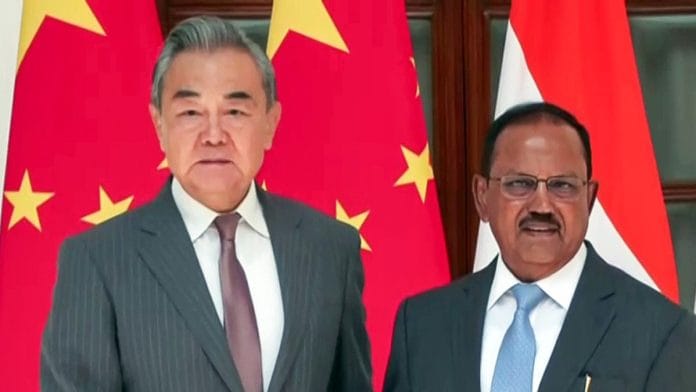New Delhi: India and China have agreed on a new expert group and a working group under the Working Mechanism for Consultation and Coordination on India-China Border Affairs (WMCC) for boundary delimitation and border management.
At the 24th round of Special Representative (SR) talks with Wang Yi Tuesday, Indian National Security Adviser Ajit Doval discussed the de-escalation at LAC, along with “delimitation and boundary affairs”. In his opening remarks, Doval welcomed “peace and tranquillity” at the border, aiding the positive momentum in New Delhi-Beijing ties.
Doval and Wang Yi agreed on five steps to push forward ties. The first is the “need to take a political perspective of the overall bilateral relationship” while “seeking a fair, reasonable and mutually acceptable framework” for settling boundary disputes in line with the 2005 Agreement on Political Parameters and Guiding Principles for Settlement of the India-China Boundary Question, the MEA said in its latest statement.
The two SRs also agreed on a new expert group and a new working group under the WMCC, with the former looking into an “early harvest” in the delimitation of boundaries between the two nations, as the latter will “advance” effective border management.
“Use the border management mechanisms at diplomatic and military levels to carry forward the process of border management, and discuss de-escalation, beginning with the principles and modalities thereof,” the MEA added in its latest statement.
The statement also stressed the “creation of General-level mechanisms in eastern and middle sectors, in addition to the existing General-level mechanism in the western sector, and holding an early meeting of the General-level mechanism in the western sector”.
Wang Yi has been on a three-day visit to India, starting Monday, when he held extensive discussions with Indian External Affairs Minister S. Jaishankar. Doval met with Wang Yi Tuesday, and the Chinese foreign minister called on Prime Minister Narendra Modi later in the evening. On Wednesday morning, Wang Yi will depart India for Islamabad.
In the SR-level talks, Wang Yi emphasised the necessity for “dual-track” progress in ties with India, and the decoupling of the border issues from the overall relationship.
The Indian side “strongly raised” the issue of terrorism in “all its forms and manifestations” with Wang Yi, a separate readout published by the Ministry of External Affairs said. New Delhi highlighted “one of the original objectives” of the Shanghai Cooperation Organisation (SCO) is to “counter the evil of terrorism”.
China, the current SCO chair, will hold the Heads of States’ Summit later this month in the city of Tianjin. For the summit, Prime Minister Narendra Modi will travel to China 31 August. “Minister Wang Yi concurred that countering terrorism should be given the highest priority,” the second readout added.
The defence ministers’ SCO meeting at the end of June did not result in a joint statement due to the lack of consensus among member-states over the Pahalgam and Jaffar Express terror attacks in India and Pakistan, respectively. India and Pakistan are members of the regional grouping. India, at the time, maintained that there could be no dilution of the “dastardly” terrorist attacks in Pahalgam, and that was conveyed to the SCO members by Defence Minister Rajnath Singh. China has for decades been close to Pakistan.
Also Read: ‘Borders have been quiet, hope for more momentum in ties’—NSA Doval to China’s Wang Yi
Dam on Brahmaputra & economic concerns
Apart from terrorism, Jaishankar raised issues surrounding China’s construction of a mega dam on the Yarlung Tsangpo River, which flows into India, where it is known as the Brahmaputra River.
“During the discussions, the external affairs minister underlined India’s concerns over the mega dam construction being undertaken by China in the lower reaches of the Yarlung Tsangpo (Brahmaputra River), which will have implications for lower riparian states,” said the second Indian readout. “The need for utmost transparency in this regard was strongly underlined.”
Earlier this year, India raised its objections to the project. In December 2024, China approved the project, which includes building the Motou Hydropower Station at the lower reaches of the Yarlung Tsangpo, the longest flowing river in Tibet.
Once constructed, the Motou Hydropower Station might emerge as the largest hydropower station in the world, with estimates indicating that it could generate nearly three times the electricity the Three Gorges Dam currently does, according to reports.
Jaishankar also raised concerns with the export restrictions imposed by China on critical goods, such as rare earth elements, tunnel boring machines, and fertilisers. Wang Yi has given assurances that China will address those concerns, as reported by ThePrint earlier.
India-China ties have seen an uptick in the last few months. The positive momentum comes at a time when the relationship between New Delhi and Washington, DC, has hit an impasse. US President Donald Trump and his administration have targeted India’s continued purchase of Russian oil, imposing tariffs of up to 50 percent, which will take effect later this month.
Diplomatic ties between New Delhi and Beijing cratered, following military clashes at Galwan during the summer months of 2020. Till the two sides disengaged at the borders, there would be no discussions at the highest levels, India had maintained.
Following an agreement to disengage at the friction points across the LAC, announced 21 October 2024 by Foreign Secretary Vikram Misri, Prime Minister Modi met with Chinese President Xi Jinping on the margins of the BRICS summit in the Russian city of Kazan on 23 October 2024.
(Edited by Madhurita Goswami)






